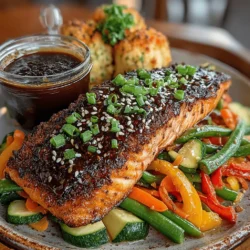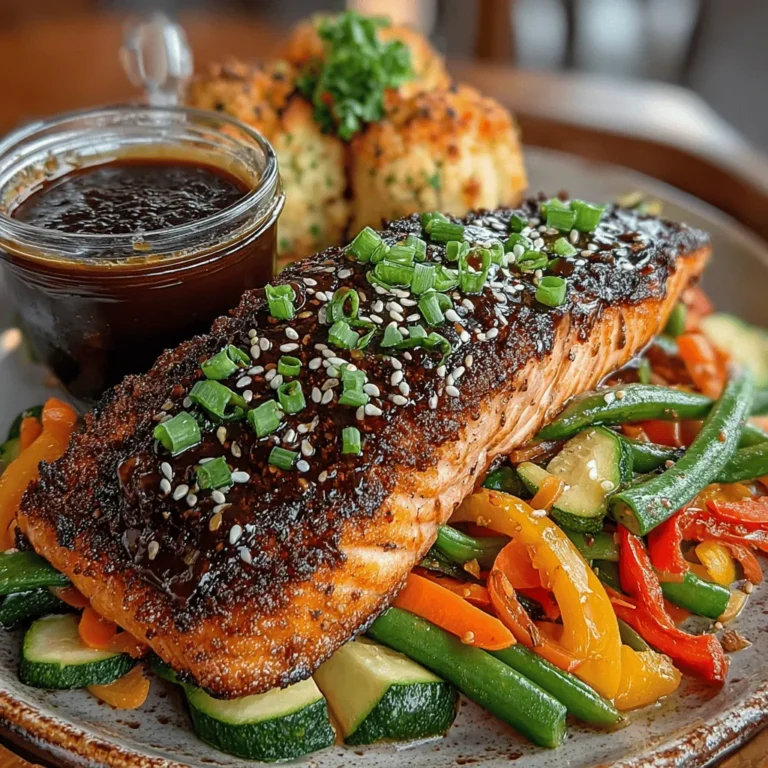Teriyaki Glazed Salmon with Colorful Veggie Medley: A Flavorful and Nutritious Dish
In the world of culinary delights, few dishes manage to strike a balance between flavor, nutrition, and convenience quite like Teriyaki Glazed Salmon with Colorful Veggie Medley. This vibrant dish, characterized by its sweet and savory teriyaki sauce, perfectly complements the rich, buttery flavor of salmon while incorporating a rainbow of vegetables that not only enhance its visual appeal but also contribute a wealth of nutrients.
For families looking to enjoy a healthy meal that pleases both adults and children alike, this recipe is a standout choice. Brimming with omega-3 fatty acids, high-quality protein, and an array of vitamins from the accompanying vegetables, it’s an excellent option for health-conscious individuals. Moreover, the preparation and cooking time are minimal, making it an ideal solution for those with busy schedules who still want to serve a nutritious, home-cooked meal.
Understanding Teriyaki Flavors
Teriyaki sauce has its roots in Japan, where it has been a staple of Japanese cuisine for centuries. The word “teriyaki” itself refers to a cooking method that involves grilling or broiling food with a glaze of soy sauce, mirin (a type of rice wine), and sugar. This combination creates a flavor profile that is both savory and slightly sweet, allowing the natural tastes of the main ingredient—be it meat or fish—to shine through.
When it comes to salmon, the rich, oily texture of the fish pairs beautifully with teriyaki sauce. The marination process is crucial here; allowing the salmon to soak in the sauce not only infuses it with flavor but also helps retain moisture during cooking. This results in a succulent, tender piece of fish that is bursting with taste. A well-marinated salmon can elevate a simple dinner to a gourmet experience, making it a perfect centerpiece for your meal.
Health Benefits of Salmon
Salmon is often lauded as one of the healthiest fish options available, and for good reason. Its nutritional profile is impressive; a single serving of salmon is rich in omega-3 fatty acids, which are essential for heart health and have been linked to reduced inflammation and improved brain function. Beyond omega-3s, salmon is an excellent source of high-quality protein, providing all the essential amino acids your body needs to function optimally.
In addition to these benefits, salmon is packed with vitamins and minerals, including B vitamins (which support energy production), selenium (an antioxidant that protects cells from damage), and potassium (which helps regulate blood pressure). When compared to other common fish options, such as tilapia or cod, salmon stands out not just for its flavor but also for its health benefits, making it a superb choice for anyone looking to boost their dietary intake of nutrients.
The Role of Vegetables in the Dish
While salmon takes center stage in this dish, the colorful veggie medley plays a crucial supporting role. The importance of incorporating a variety of vegetables cannot be overstated, as different colors often represent different nutrients and health benefits.
In this recipe, we’re using a selection of vibrant vegetables: bell peppers, snap peas, zucchini, and carrots. Each of these ingredients brings its own unique flavor and nutritional profile to the table.
– Bell Peppers: These crisp vegetables come in various colors, each packed with vitamin C and antioxidants. They add a sweet crunch to the dish and offer anti-inflammatory benefits.
– Snap Peas: Known for their sweet and slightly grassy flavor, snap peas are a fantastic source of fiber and vitamins A, C, and K. Their fresh texture contrasts nicely with the rich salmon and adds a delightful snap to every bite.
– Zucchini: This versatile squash is low in calories yet high in vitamins and minerals, including vitamin C and potassium. Its mild flavor allows it to absorb the teriyaki sauce beautifully, making it a perfect complement to the dish.
– Carrots: Bright orange and packed with beta-carotene, carrots not only add a splash of color but also contribute significant amounts of fiber and vitamin A, which is vital for eye health and immune function.
Together, these vegetables create a colorful and nutritious medley that enhances the overall appeal of the dish. Not only do they provide a diverse range of vitamins and minerals, but they also contribute dietary fiber, which aids in digestion and helps maintain a healthy weight.
Ingredients Breakdown
To prepare the Teriyaki Glazed Salmon with Colorful Veggie Medley, you will need the following ingredients:
– Salmon fillets: Fresh, skin-on salmon fillets are ideal for this dish, as the skin helps retain moisture during cooking.
– Teriyaki sauce: You can use store-bought teriyaki sauce or make your own using soy sauce, mirin, sugar, and sesame oil.
– Bell peppers: Choose a mix of red, yellow, and green for a vibrant presentation.
– Snap peas: Fresh snap peas are preferred for their sweetness and crunch.
– Zucchini: Slice into half-moons for even cooking.
– Carrots: Julienne or slice thinly to ensure they cook quickly and evenly.
As you gather these ingredients, prepare yourself for a dish that is not only visually stunning but also rich in flavor and nutrition. In the next section, we will delve into the preparation and cooking steps that will bring this delicious teriyaki glazed salmon and colorful veggie medley to your table.
{{image_2}}
Ingredients
To create a delicious Teriyaki Glazed Salmon with Colorful Veggie Medley, selecting fresh and high-quality ingredients is essential. Here’s what you’ll need:
For the Teriyaki Glazed Salmon:
– 4 salmon fillets (6 ounces each), skin-on for extra flavor and crispiness
– 1/2 cup teriyaki sauce (look for low-sodium and gluten-free options if needed)
– 1 tablespoon fresh ginger, minced
– 2 cloves garlic, minced
– 1 tablespoon sesame oil
For the Colorful Veggie Medley:
– 1 cup bell peppers (red, yellow, and green), sliced
– 1 cup broccoli florets
– 1 cup snap peas, trimmed
– 1 cup carrots, julienned
– 2 tablespoons olive oil
– Salt and pepper to taste
– Optional: 1 tablespoon soy sauce (or tamari for gluten-free)
Ingredient Substitutions
– Salmon: If you’re looking for a vegetarian alternative, consider using tofu or tempeh instead. For seafood alternatives, you might also try trout or mackerel.
– Teriyaki Sauce: For a gluten-free version, opt for tamari or make your own with gluten-free soy sauce. Alternatively, you can create a homemade teriyaki sauce using coconut aminos for a lighter option.
– Vegetables: Feel free to substitute with your favorite seasonal vegetables. Zucchini, asparagus, or cauliflower can be excellent additions or replacements.
Sourcing Fresh and Sustainable Ingredients
When preparing this dish, prioritize sourcing sustainable salmon. Look for labels like “wild-caught” or “sustainably farmed.” Many local fish markets provide information on the origins of their seafood, ensuring you make an environmentally conscious choice. For your vegetables, consider shopping at local farmers’ markets or purchasing organic produce to guarantee freshness and support local agriculture.
Step-by-Step Preparation Guide
Marinating the Salmon
Marinating the salmon is crucial for infusing it with flavor. Begin by combining the teriyaki sauce, minced ginger, minced garlic, and sesame oil in a shallow dish. Place the salmon fillets in the marinade, ensuring they are evenly coated. Cover and refrigerate for at least 30 minutes, allowing the flavors to penetrate the fish. For optimal results, marinate for up to 2 hours. However, avoid marinating for too long, as the acidity in the sauce can change the texture of the fish.
Preparing the Vegetables
While the salmon marinates, prepare your colorful veggie medley. Start by washing all vegetables thoroughly.
– Chopping Techniques:
– For bell peppers, slice them into thin strips to ensure they cook evenly and quickly.
– Cut the broccoli into small florets to allow for even cooking.
– Julienne the carrots by slicing them into long, thin strips for a more refined presentation.
To maintain freshness, consider preparing the vegetables just before you sauté them. This will help preserve their vibrant colors and nutrients.
Sautéing the Vegetables
In a large skillet, heat the olive oil over medium-high heat. Once hot, add the chopped vegetables. Sauté for 5-7 minutes, stirring frequently until they are tender yet still crisp. To retain maximum nutrients and flavor, avoid overcooking. If desired, add a splash of soy sauce at the end of cooking for an extra umami punch. Season with salt and pepper to taste, then set aside.
Cooking the Salmon to Perfection
To achieve perfectly cooked salmon, the method and timing are key. Here are some techniques to ensure your salmon is crispy on the outside and flaky on the inside.
Techniques for Cooking Salmon
For this recipe, using a non-stick or cast-iron skillet is ideal to achieve crispy skin.
1. Preheat the Skillet: Heat your skillet over medium-high heat and add a drizzle of oil. Ensure the skillet is hot before adding the salmon—this helps to sear the skin.
2. Cooking the Salmon: Place the salmon fillets in the skillet, skin-side down. Cook for about 4-5 minutes without moving them to allow the skin to become crispy. Flip the fillets and cook for an additional 3-4 minutes, depending on the thickness of your salmon and your preferred doneness. The internal temperature should reach 145°F (63°C) for safe consumption.
Cooking Times Based on Thickness
As a general rule:
– For fillets that are 1-inch thick, cook for about 4 minutes per side.
– Thicker fillets may require an additional minute or two per side.
If you prefer your salmon medium-rare, aim for an internal temperature of 125°F (52°C).
Choosing the Right Skillet and Temperature
A well-seasoned cast-iron skillet provides the best results, allowing for even heat distribution. If using non-stick, ensure the surface is well-coated with oil to prevent sticking. Always monitor the heat; if the salmon is browning too quickly, reduce the temperature slightly.
Presentation and Serving Suggestions
A visually appealing presentation can elevate your dining experience. Here are some tips for serving your Teriyaki Glazed Salmon with Colorful Veggie Medley.
Arranging the Dish
Begin by placing a generous serving of the sautéed vegetable medley in the center of each plate. Lay the salmon fillet on top, skin-side up to showcase the crispy skin. Drizzle any remaining teriyaki sauce over the salmon for extra flavor and shine.
Garnishing Ideas
To add a finishing touch, sprinkle sesame seeds and finely chopped green onions over the dish. For those wanting a little extra kick, consider drizzling with additional teriyaki sauce or a dash of sriracha.
Side Dish Pairings
This dish pairs beautifully with a variety of sides:
– Rice: Serve with steamed jasmine or brown rice to soak up the teriyaki sauce.
– Quinoa: For a protein-packed option, quinoa can add a nutty flavor and unique texture.
– Salad: A fresh salad with mixed greens, cucumbers, and a light vinaigrette can provide a refreshing contrast to the rich flavors of the salmon.
Conclusion
The Teriyaki Glazed Salmon with Colorful Veggie Medley is not only a feast for the eyes but also a wholesome meal bursting with flavor and nutrients. The combination of tender salmon glazed in a savory teriyaki sauce along with the crunchy, vibrant vegetables makes it a delightful dinner option that’s both healthy and satisfying.
Encouraging family and friends to try their hand at this recipe can create lasting memories around the dinner table. Feel free to experiment with different vegetables or garnishes to make this dish uniquely yours. The joy of cooking with fresh, high-quality ingredients is immeasurable, and the satisfaction of sharing a homemade meal is unparalleled. Dive into this culinary adventure, and you may just find that this dish becomes a family favorite for years to come.


